Please Follow us on Gab, Minds, Telegram, Rumble, Gab TV, GETTR, Truth Social
The CD Media Big Data Poll for the Arizona Midterm Elections was conducted by Big Data Poll and interviewed 1,298 likely general election midterm voters statewide via Peer-2-Peer SMS/OSP from July 16 to July 18, 2022. The overall survey sampling error is ± 2.7% at a 95% confidence interval. It’s important to note that sampling errors for subgroups are higher. Results are weighted to represent statewide voter file demographics to include gender, age, race and region. The proprietary likely voter model is determined by both self-reported likelihood and 4-cycle primary vote history. The full crosstabs can be viewed on MarketSight and methodology on Google Sheets.

The CD Media Big Data Poll finds voters in Arizona are set to approve at least two key ballot measures this November, while others fall short. The results indicate voters in the Grand Canyon State are inclined to strengthen voter identification requirements, as well as make it more difficult to amend the constitution and pass future ballot initiatives.
In November, voters will decide whether to allow in-state tuition for residents without legal citizenship status. If approved, the ballot measure would necessarily repeal related provisions of Proposition 300, which passed in a statewide referendum back in 2006. As of now, voters are leaning toward opposing the ballot measure.
Only 34.3% say they’ll vote “Yes” to support and 47.7% would vote “No” to oppose passage, with 18.0% undecided. Of those most certain to vote, the measure is failing 49.5% to 34.5%. Republicans (63.3% to 24.1%) are more likely than Democrats (31.8% to 50.3%) and Independents/Others (45.3% to 29.5%) to vote “No” over “Yes”.
In the wake of the 2020 election and statewide audit, Arizona has been at the forefront of the battle over election reforms. Voters will also decide whether to require a date of birth and voter identification number for mail-in ballots and to eliminate a two-document alternative to photo identification for in-person voting.
The CD Media Big Data Poll finds overwhelming support for this ballot measure, with 62.5% saying they will vote “Yes” to approve it and only 23.4% intend to vote “No”, with another 14.1% undecided. Republicans (78.5% to 11.5%) and Independents/Others (63.3% to 18.8%) are more likely than Democrats (43.3% to 41.3%) to vote “Yes” over “No”.
By a 45.4% to 23.5% margin, voters are leaning toward creating the Office of Lieutenant Governor, which will be elected on a joint ticket mirroring the presidential election. However, the ballot measure has not yet achieved majority support and 31.1% remain undecided.
Voters in Arizona are also set to approve the ballot measure to change voting threshold requirements to a supermajority (60%) rather than a simple majority on all future ballot initiatives. A 53.3% majority say they will vote “Yes” compared to only 18.0% who will vote “No”, with 28.7% undecided.
“Overall, the ideological mood of the electorate is leaning toward Republicans and more conservative policy,” Big Data Poll Director Rich Baris, said of the results. “Independent and third party voters are more aligned with Republican voters on these four ballot initiatives.”
As of July 24, 2022, eight statewide ballot measures were certified in Arizona for the midterm elections on November 8, 2022. The Arizona Right to Reproductive Freedom Initiative failed to gather the 356,467 valid signatures required and thus did not make the ballot. Below are the four of eight gauged by the CD Media Big Data Poll, to include instructional prompts used to explain each to respondents.
The CD Media Big Data Poll for the Arizona Midterm Elections was conducted by Big Data Poll and interviewed 1,298 likely general election midterm voters statewide via Peer-2-Peer SMS/OSP from July 16 to July 18, 2022. The overall survey sampling error is ± 2.7% at a 95% confidence interval. It’s important to note that sampling errors for subgroups are higher. Results are weighted to represent statewide voter file demographics to include gender, age, race and region. The proprietary likely voter model is determined by both self-reported likelihood and 4-cycle vote history. The full crosstabs can be viewed on MarketSight and methodology on Google Sheets.
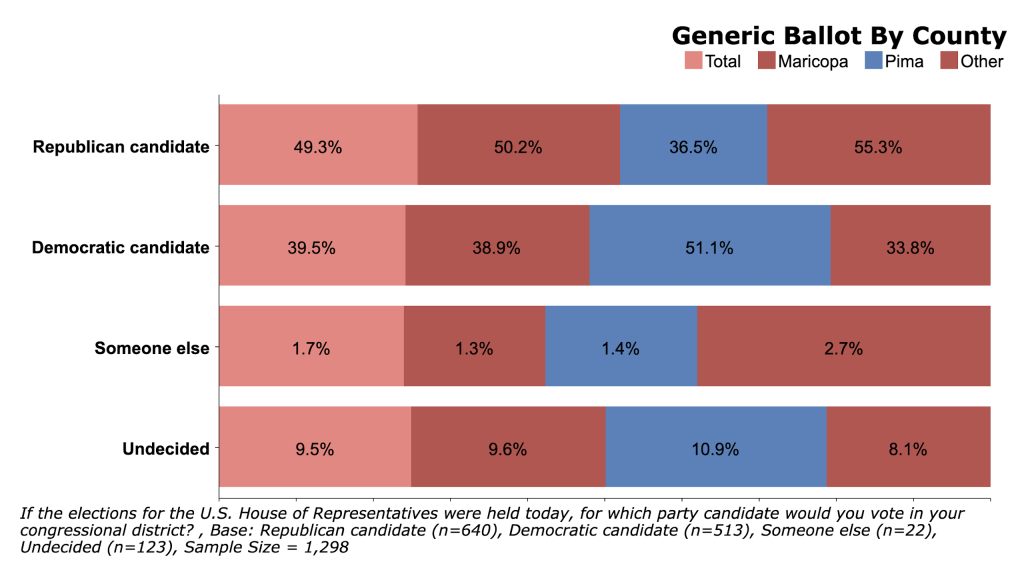
The CD Media Big Data Poll finds Republicans leading Democrats on the Generic Ballot in Arizona, 49.3% to 39.5%. Maricopa County, which represents roughly 60% of the vote statewide, is breaking for the Republican candidate 50.2% to 38.9%. Democrats lead in Pima County 51.1% to 36.5%, but trail 55.3% to 33.8% in the rest of the state.
That roughly 9-point lead is far outside the survey sampling error and indicates all three competitive congressional districts in the state Lean Republican ahead of November.
“Historically, the incumbent party in power nationally performs poorly in first-term incumbent midterms,” Big Data Poll Director Rich Baris, said. “Given the closeness of the state over the last three election cycles, we shouldn’t at all be surprised by these findings.”
“If we scratch beneath the surface and dig a little deeper into the results, the findings reveal clear advantages for Republicans heading into November.”
| OLD Arizona House (2021) | NEW Arizona House (2022) |
|---|---|
| 4 Solid DEM/Biden | 3 Solid DEM/Biden |
| 3 Solid GOP/Trump | 3 Solid GOP/Trump |
| 2 Competitive/Battlegrounds | 3 Competitive/Battlegrounds |
Congressional Districts: 9 Seats
Men prefer the Republican candidate 54.7% to 35.0% and women are split 44.2% to 43.8%. The last election in which the two party vote split among women was 2010, a year in which the GOP posted historic gains to retake the U.S. House of Representatives.
Far fewer Democrats (53.2%) than Republicans (64.5%) report being “extremely” enthusiastic to vote in November, an 11.3% enthusiasm edge for the GOP. Among extremely enthusiastic voters, Republicans hold a 57.0% to 38.8%, edge, and among “very” enthusiastic voters, 48.2% to 41.5%. Democrats lead among “moderately” (40.7% to 33.1%) and “slightly” (34.4% to 32.1%) enthusiastic voters.
Unfortunately for Democrats, the unenthused will represent a much smaller share of the electorate in November. Nearly all voters (97.4%) who reported being “extremely” enthusiastic also reported being “certain to vote” in November. That certainty to vote compares to just 55.7% who are “moderately” enthusiastic, 39.8% who are “slightly” enthusiastic, and 57.9% who are “not at all” enthusiastic.
Of those certain to vote, Republicans lead 52.3% to 39.8%. Democrats lead 38.2% to 34.4% among lower propensity potential midterm voters (less than certain but ≥ 50/50 likelihood).
White voters back Republicans for the U.S. Congress 54.0% to 36.4%, while Hispanic voters still lean slightly toward Democrats, 45.5% to 38.8%. Independent and third party voters support the Republican candidate, 44.0% to 29.9%.
The Generic Ballot could also signal deep trouble for first-term incumbent Democratic Senator Mark Kelly. As the CD Media Big Data Poll previously reported, Kelly is fighting for his political survival in the U.S. Senate against Republican frontrunner Blake Masters. The incumbent holds a slight 3-point lead, or 43.7% to 40.6% with 7.8% opting for someone else and another 8.0% undecided.
However, of those who are undecided in the race for U.S. Senate, 54.1% strongly disapprove of the job Joe Biden is doing as president and only 4.1% strongly approve. Overall, the president is underwater with undecided voters in the senatorial contest by an astonishing 76.5% to 19.1%.
“The relationship between presidential approval ratings and midterm performance for their party candidate is well established,” Director Baris stated. “The president is deeply unpopular in the Grand Canyon State and that dissatisfaction will weigh down Democratic candidates up and down the ballot this fall.”
The CD Media Big Data Poll also previously reported Biden’s approval rating in Arizona at only 36.2% and disapproval has skyrocketed to 62.0%. Roughly half (49.5%) of all likely midterm voters strongly disapprove of the job he’s doing as president, while only 13.3% strongly approve, resulting in an intensity index of -36.2.
Of those who are undecided on the Generic Ballot, 43.6% strongly disapprove of the job Biden is doing and another 25.4% somewhat disapprove. Just over a quarter combined approve of the Democratic president.
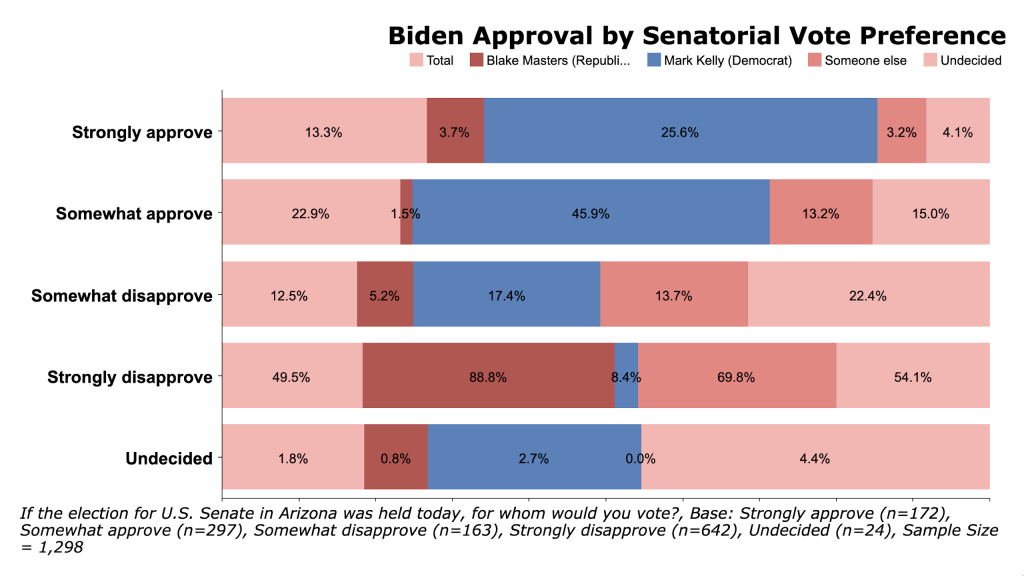
The CD Media Big Data Poll finds Democratic incumbent Senator Mark Kelly fighting for his political life in the U.S. Senate against Republican frontrunner Blake Masters in Arizona. Kelly holds a slight early lead over Masters 43.7% to 40.6% with 7.8% opting for someone else and another 8.0% undecided.
Of those who are undecided, 54.1% strongly disapprove of the job Joe Biden is doing as president and only 4.1% strongly approve. Overall, the president is underwater with undecided voters in the senatorial contest by an astonishing 76.5% to 19.1%. According to Big Data Poll Director Rich Baris, those voters are highly unlikely to vote for the incumbent Democrat.
“The relationship between presidential approval ratings and midterm performance for their party candidate is well established,” Director Baris stated. “The president is deeply unpopular in the Grand Canyon State and that dissatisfaction will weigh down Democratic candidates up and down the ballot this fall.”
As CD Media previously reported, Biden’s approval rating in Arizona is only 36.2% and disapproval has skyrocketed to 62.0%. Roughly half (49.5%) of all likely midterm voters strongly disapprove of the job he’s doing as president, while only 13.3% strongly approve, resulting in an intensity index of -36.2. White voters have the strongest disapproval at 54.1%, but strong support for the president is the lowest among Hispanic voters at only 11.2%.
“Historically speaking, the 2022 midterm elections are expected to be difficult for the incumbent party in power nationally,” Director Baris added. “But if we scratch beneath the surface and dig a little deeper into the results, the findings indeed reveal multiple Republican advantages.”
Far fewer Democrats (53.2%) than Republicans (64.5%) report being “extremely” enthusiastic to vote in November, an 11.3% enthusiasm edge for the GOP. Masters leads Kelly among extremely enthusiastic voters, 46.9% to 40.0%.
Nearly all voters (97.4%) who reported being “extremely” enthusiastic also reported being “certain to vote” in November. That certainty to vote compares to just 55.7% who are “moderately” enthusiastic, 39.8% who are “slightly” enthusiastic, and 57.9% who are “not at all” enthusiastic.
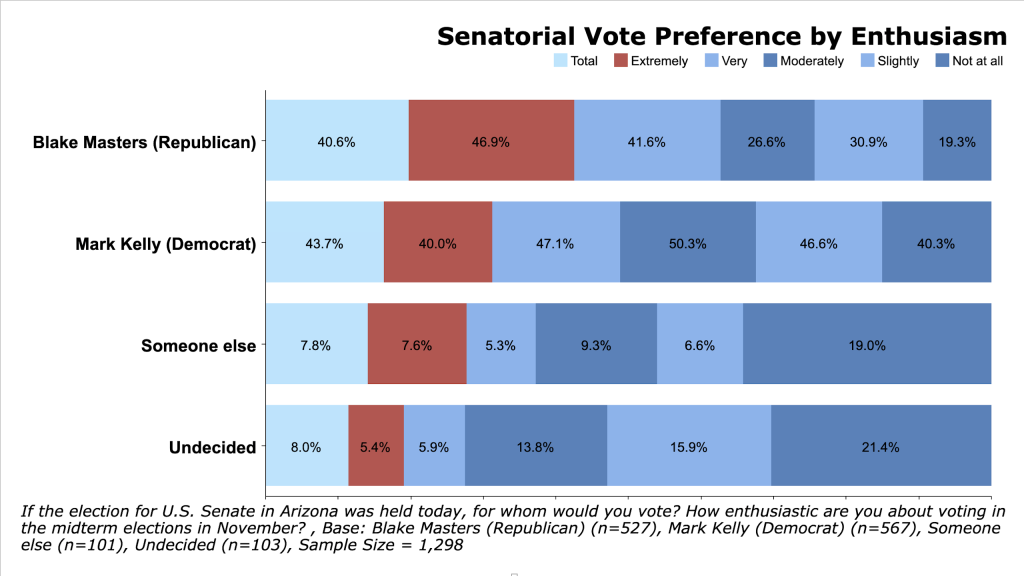
Of those most likely to vote, the two candidates are tied at 43.3%. Kelly leads 45.5% to 27.2% among lower propensity potential midterm voters (≥ 50/50 likelihood).
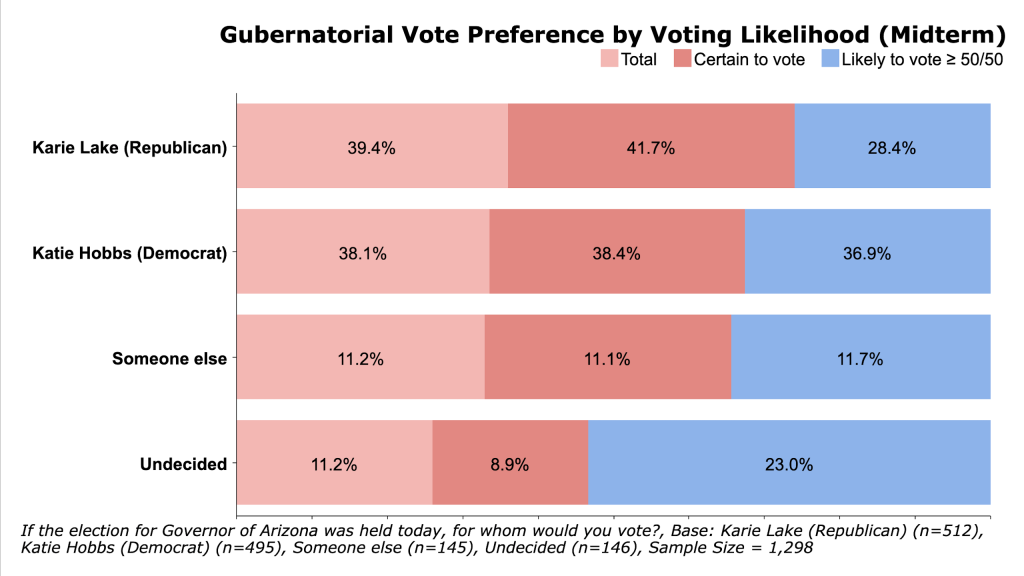
The CD Media Big Data Poll finds Republican Kari Lake and Democratic Secretary of State Katie Hobbs in a tight race for governor of Arizona. Lake holds a slight early lead over Hobbs 39.4% to 38.1% with 11.2% opting for someone else and another 11.2% undecided.
“Historically speaking, the 2022 midterm elections are expected to be difficult for the incumbent party in power nationally,” Big Data Poll Director Rich Baris, said. “But if we scratch beneath the surface and dig a little deeper into the results, the findings indeed reveal multiple Republican advantages.”
Far fewer Democrats (53.2%) than Republicans (64.5%) report being “extremely” enthusiastic to vote in November, an 11.3% enthusiasm edge for the GOP. Lake edges Hobbs among extremely enthusiastic voters, 45.4% to 37.8%, and among “very” enthusiastic voters, 38.7% to 38.3%. Hobbs leads among those unenthused, including “not at all” enthusiastic, 41.3% to 26.2%.
“The closer we get to Election Day, three things will happen,” Director Baris, added. “Third party vote share will decline, voters will begin to pay more attention and we will begin to tighten the likely voter screen.”
“Come Labor Day, all things being equal, all three will most likely have benefitted Lake and her narrow lead will grow.”
Nearly all voters (97.4%) who reported being “extremely” enthusiastic also reported being “certain to vote” in November. That certainty to vote compares to just 55.7% who are “moderately” enthusiastic, 39.8% who are “slightly” enthusiastic, and 57.9% who are “not at all” enthusiastic,
Of those most likely to vote, Lake leads 41.7% to 38.4%. Hobbs leads 36.9% to 28.4% among lower propensity potential midterm voters (≥ 50/50 likelihood).
Unlike Hobbs, Lake has faced competition for the gubernatorial nomination, though she leads her closest rival by double digits ahead of the primary on August 2. But for now, the competition has resulted in more self-identified Republicans opting for “someone else” in the hypothetical matchup than her opponent across the aisle.
That disparity in base consolidation is being more than offset by a large lead for the Republican among independent and third party voters. Lake leads Hobbs 39.8% to 30.3% among non-two party voters. Further, Director Baris expects that disparity to be temporary.
“Come November, whomever is the Republican nominee will almost assuredly be able to count on 9 in 10 base support,” he said. “This is a first-term incumbent midterm and while this is rather common for early polling during competitive primaries, it is almost unheard-of for it to remain throughout the general election.”
Hobbs leads Lake among urban voters, but trails among rural and suburban voters. Men prefer Lake 44.6% to 32.8%, while women back Hobbs 43.2% to 34.6%.
Of those who are undecided, 42.7% strongly disapprove of the job Joe Biden is doing as president and only 7.0% strongly approve. Overall, the president is underwater with undecided voters in the gubernatorial contest, 27.5% to 66.1%.
“The relationship between presidential approval ratings and midterm performance is well established,” Director Baris concluded. “The president is deeply unpopular in the Grand Canyon State and that dissatisfaction will weigh down Democratic candidates up and down the ballot this fall.”
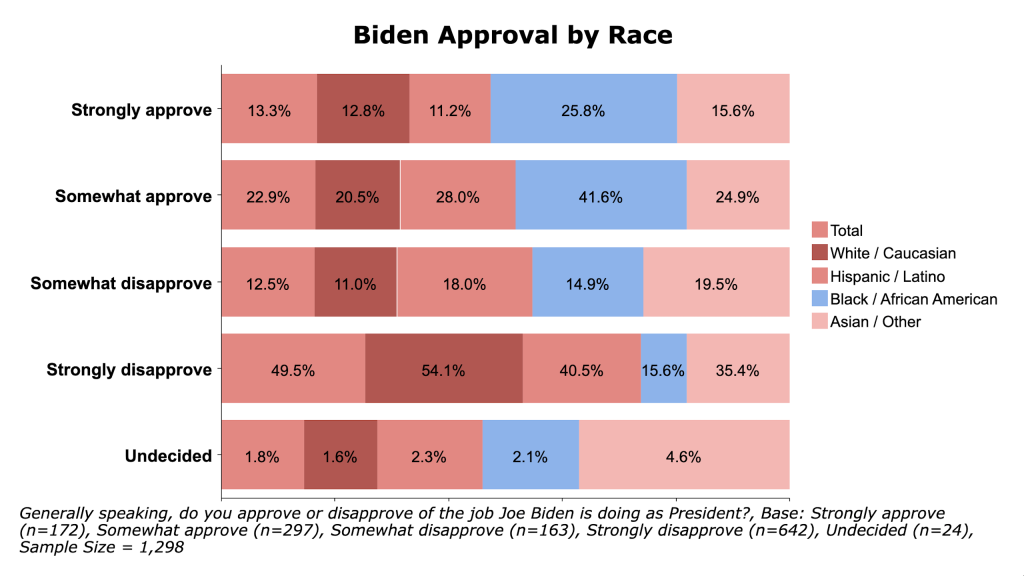
President Joe Biden’s approval rating in Arizona is only 36.2% and disapproval has skyrocketed to 62.0%, the CD Media Big Data Poll finds. This dissatisfaction with the president statewide extends to his party and is weighting down statewide candidates ahead of the 2022 midterm elections.
“The first Democratic presidential nominee to win the state since Bill Clinton in 1996 is now underwater with every single racial demographic except one,” Big Data Poll Director Rich Baris, said. “Mr. Biden is deeply unpopular in the Grand Canyon State and it will impact Democratic candidates on the ballot this November.”
Worth noting, neither of the two most recent Democratic presidential candidates to carry the state did so with majorities. Clinton won the state with 46.5% to 44.3% over Bob Dole the year Ross Perot earned 8.0%. Biden’s margin was only 0.3% at 49.4%.
Now, roughly half (49.5%) of all likely midterm voters strongly disapprove of the job he’s doing as president, while only 13.3% strongly approve, resulting in an intensity index of -36.2. White voters have the strongest disapproval at 54.1%, but strong support for the president is the lowest among Hispanic voters at only 11.2%.
Overall, only 33.3% of White voters approve and they are being dwarfed by the 65.1% who disapprove. In another ominous sign for Democrats, Biden is underwater with the critical Hispanic demographic 58.5% to 39.2%.
“Granted exit polls should always be more of a guidepost than Gospel, but they showed Mr. Biden carrying Hispanics 61% to 37%,” Mr. Baris added. “Many Hispanics who disapprove of the president are self-identifying as independents no matter their registration, and they remain undecided in key races simply because they’re not paying close attention yet.”
“It’s not even Labor Day.”
The president is enjoying majority support only among Black voters in Arizona, a demographic set to represent single digits in the electorate this November. Still, 68.4% approve of the job Mr. Biden is doing as president, though that includes only 25.8% who strongly approve. Overall disapproval among the most loyal Democratic voting bloc has shot to 30.5%.
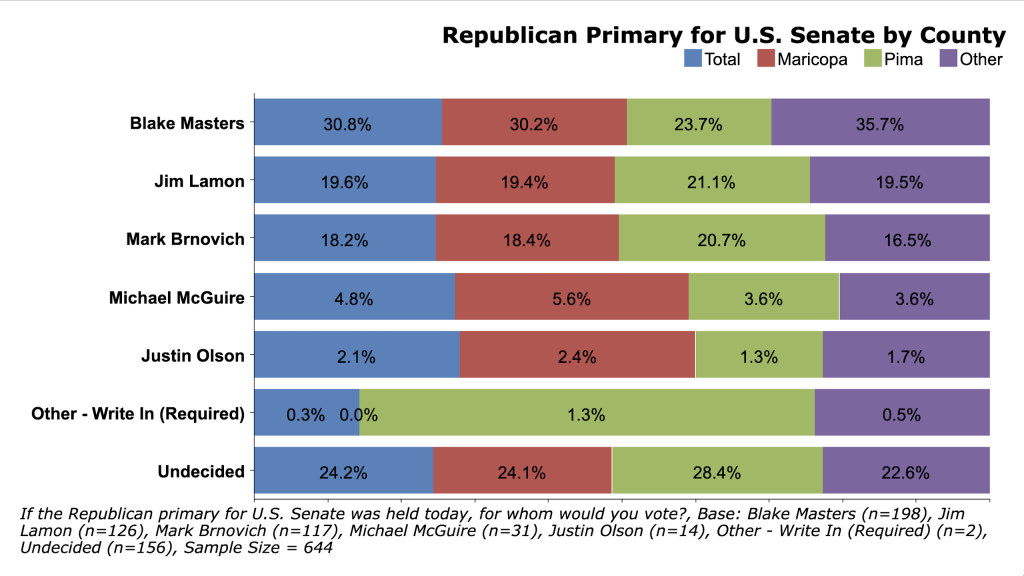
Blake Masters has surged to 30.8% and now leads his closest rival in the Republican primary for U.S. Senate in Arizona by 11 points, the CD Media Big Data Poll finds. Jim Lamon (19.6%) and Mark Brnovich (18.2%) are locked in a tight race for second place, with 24.2% still undecided.
Michael McGuire and Justin Olson round out fourth and fifth with 4.8% and 2.1%, respectively.
“Blake Masters has risen steadily over the last few days and has now broken double-digits,” Big Data Poll Director Rich Baris, said. “His coalition is more diverse and more motivated to vote than any other in this race.”
“Without a doubt, the Trump-endorsed ticket is in the lead.”
The Grand Canyon State has become the latest battleground for control over the Republican Party. Former President Donald J. Trump has endorsed Blake Masters for U.S. Senate and Kari Lake. The Republican Establishment represented by former Vice President Mike Pence and Governor Doug Ducey are either directly or indirectly supporting their opponents.
As CD Media previously reported, Lake leads Karrin Taylor Robson, 43.1% to 28.8%, with 18% undecided. In both cases, enthusiasm and likelihood to vote favor the America First ticket. Masters leads among those who are “extremely” enthusiastic by 14 points, 34.8.0% to 21.4% for Lamon. Of those who are “very” enthusiastic, Masters leads 29.8% to 20.8% for Brnovich.
Among voters who are “certain to vote or have already voted”, Masters leads 32.1% to 20.6% for Lamon and 17.5% for Brnovich.
In Maricopa, which accounts for roughly 6 in 10 votes statewide, Masters leads 30.2% to 19.4% over Lamon. Brnovich takes 18.2% of the vote in the state’s largest county. In Pima, Masters holds a slight edge over Lamon 23.7% to 21.1%, with Brnovich close behind at 20.7%. The remaining counties are also supporting Masters over Lamon and Brnovich by a combined 35.7% to 19.5% and 16.5%.
Primary participation and political leanings reveal Republicans will have a turnout advantage on August 2, as well as in November. When asked, 56.1% of likely primary voters report they will vote in the Republican primary, while 43.9% will vote in the Democratic primary.
Only 1.9% of Republicans claim they will vote in the Democratic primary, while 3.7% of Democrats report they will cross the aisle. Independent and third-party voters are overwhelmingly participating in the Republican contests, 61.6% to 38.4%.
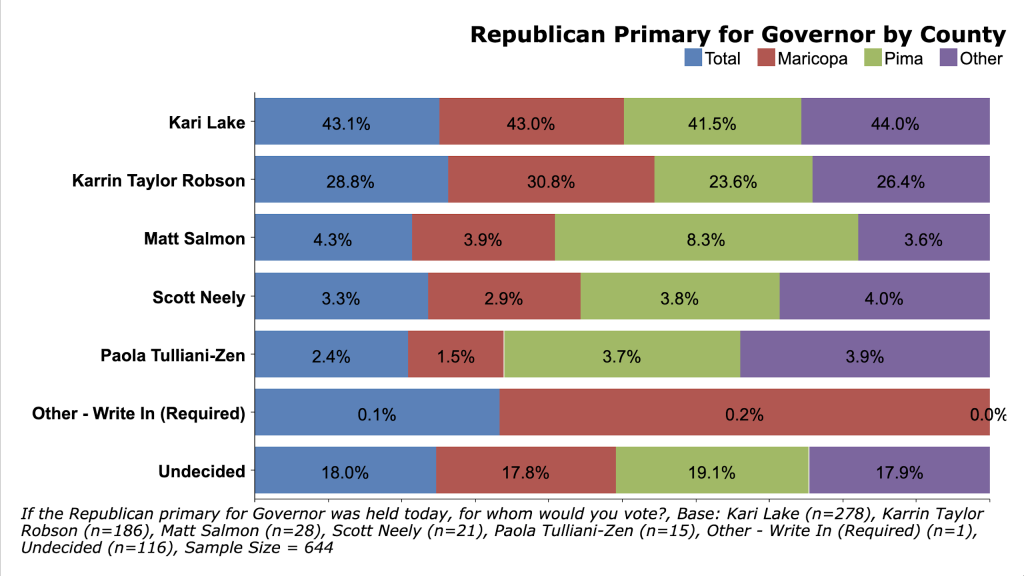
The CD Media Big Data Poll finds Kari Lake leading by a double-digit margin over Karrin Taylor Robson, 43.1% to 28.8%, with 18% undecided. Matt Salmon, who dropped out and endorsed Robson, will still appear on the ballot and placed a distant third at 4.3%. Scott Neely and Paola Tulliani-Zen round out fourth and fifth with 3.3% and 2.4%, respectively.
The Grand Canyon State has become the latest battleground for control over the Republican Party. Former President Donald J. Trump has endorsed Kari Lake, while the Republican Establishment represented by former Vice President Mike Pence and Governor Doug Ducey have come out in support of Robson.
“‘While there was some evidence Robson was gaining last week, our polling indicates Lake has begun to close that door on her competition,” Big Data Poll Director Rich Baris, stated. “Over the weekend, the frontrunner gained with every key demographic and has a much easier path to victory.”
Voting is already underway and Lake is dominating among voters who have yet to vote but plan to vote before Election Day (41.7% to 25.8%) and those who plan to vote on Election Day (46.7% to 20.5%). Robson holds a statistically insignificant lead among those who have already cast a ballot, 42.5% to 41.9%.
Enthusiasm and likelihood to vote also favor Lake, who leads among those who are “extremely” enthusiastic by 18 points, 49.0% to 30.6%. Of those who are “very” enthusiastic, Lake leads by a whopping 20-point margin, 43.8% to 23.4%. Voters who are “certain to vote or have already voted” back Lake over Robson, 45.5% to 30.2%.
In a more ominous sign for Robson, the two largest counties are backing Lake.
In Maricopa, which accounts for about 6 in 10 votes, voters are breaking her way 43.0% to 30.8% over Robson. In Pima, Lake leads 41.5% to 23.6%. The remaining counties are also supporting Lake by a combined 44.0% to 26.4%.
Primary participation and political leanings reveal Republicans will have a turnout advantage on August 2, as well as in November. When asked, 56.1% of likely primary voters report they will vote in the Republican primary, while 43.9% will vote in the Democratic primary. Only 1.9% of Republicans claim they will vote in the Democratic primary, while 3.7% of Democrats report they will cross the aisle.
Independent and third-party voters are overwhelmingly participating in the Republican contests, 61.6% to 38.4%.
Meanwhile, Secretary of State Katie Hobbs leads the Democratic primary field with 53.8% to 12.2% for Marco Lopez. Aaron Lieberman, who also withdrew but will appear on the ballot, still draws 3.9%. Roughly 3 in 10 (30.4%) Democratic primary voters in Arizona remain undecided even though it’s widely believed Sectary Hobbs is running essentially uncontested.
The CD Media Big Data Poll for the Arizona Primary and Midterm Elections was conducted by Big Data Poll and interviewed 1,172 likely primary voters statewide via Peer-2-Peer SMS/OSP from July 16 to July 18, 2022. The overall survey sampling error is ± 2.9% at a 95% confidence interval. It’s important to note that sampling errors for subgroups are higher. The sampling error for Republican primary voters (N=644) is ± 3.9% at a 95% confidence interval, and the sampling error for Democratic primary voters (N=504) is ± 4.4% at a 95% confidence interval. Results are weighted to represent statewide voter file demographics to include gender, age, race and region. The proprietary likely voter model is determined by both self-reported likelihood and 2/4-cycle primary vote history. The full crosstabs can be viewed on Google Sheets.
Subscribe to our evening newsletter to stay informed during these challenging times!!